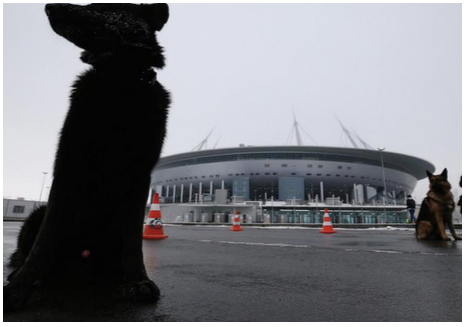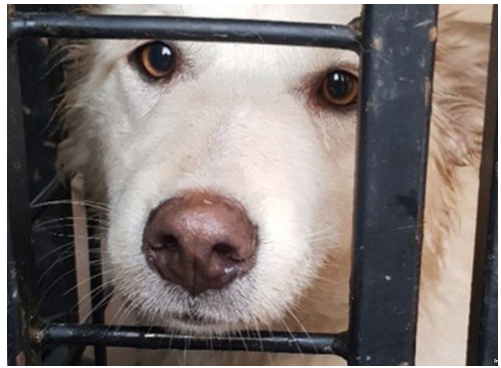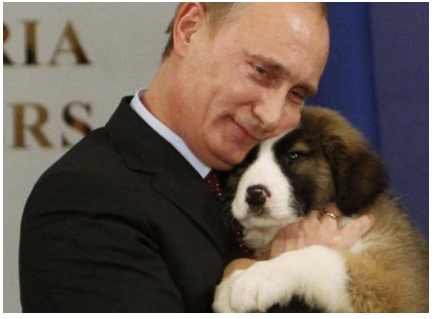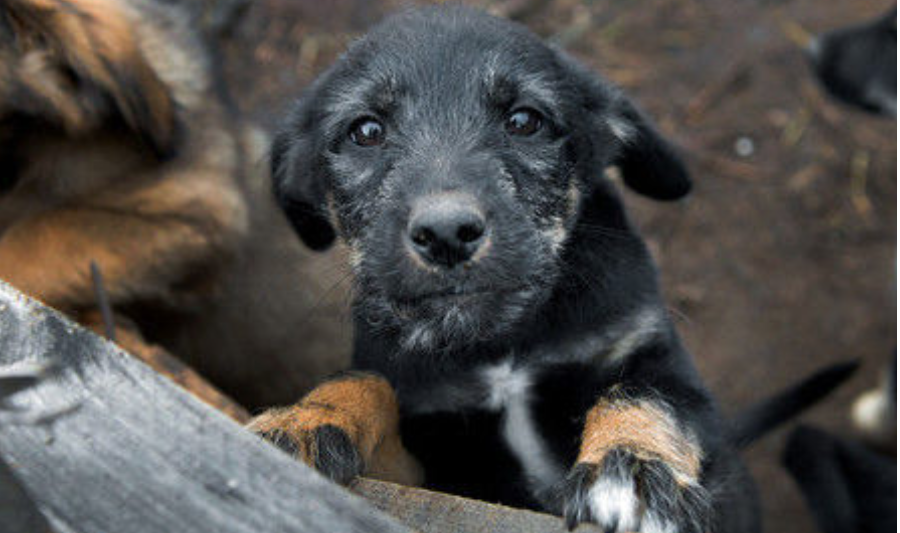CommentsANIMAL WATCH-While the U.S. focused on possible Russian influence in the election of President Donald Trump, Vladimir Putin signed an almost-unnoticed historic law to end animal cruelty in Russia, including a ban on dog fighting and animals in petting zoos, and establishing breed-specific laws (BSL) and dangerous dog controls.
But, one international animal-protection group calls it "fake news."
Putting this in perspective, Russia is the world's largest country and covers nine (9) time zones. Its land mass stretches almost halfway around the planet, with a human population of approximately 138,082,178.
It is estimated that Russia has a total dog population of around 15 million, with at least 35,000 homeless dogs (2010 estimate) roaming Russia’s capital city – about 84 dogs per square mile. The most famous are the “Metro dogs” of Moscow. Most are born in the streets, but many are abandoned as adults. A very few are survivors of repeated litters of “throw-away” puppies discarded by the many irresponsible owners who do not spay their pets.
LAW 'ON RESPONSIBLE TREATMENT OF ANIMALS'
Putin signed 'The law on responsible treatment of animals in Russia" eight years after it was submitted to the State Duma in 2010.
"The new law — welcomed tepidly by animal welfare activists — bans animal fights, pet cafes and petting zoos that house exotic animals, often inside malls. Bars and restaurants are also banned from housing animals, while wild animals cannot be kept in apartments and private houses," reports the Moscow Times the bill also prohibits the killing of animals “under any pretext.”
It imposes strict regulations on pet ownership, including walking dogs in designated areas and fining owners for failing to pick up after them. Owners are required to muzzle and put a leash on potentially dangerous breeds, a category that the state will define at a later time.
“This law covers only one percent of what we’d like to see,” Irina Novozhilova, head of the animal rights group Vita, told the RBC broadcaster.
'FORGOTTEN ANIMALS' CALLS IT ‘FAKE NEWS’
Forgotten Animals, an international animal-advocacy group with headquarters in Russia and the UK, cautioned that, although news agencies around the world have praised the Russian government and President Putin for the New Year's “gift” which outlaws “all forms of cruelty to animals” and bans killing, and other forms of mistreatment of animals, "anyone using critical thinking would immediately realize that there is something wrong."
For instance, "Hunting, fur and meat farms are still very legal. So are traveling dolphinaria (aquariums where dolphins are used for public entertainment), so obviously the new law does NOT concern ALL animals," they warn, "but that is not even the biggest issue."
Although it sounds like an animal lover’s dream, here's why [the new law] is actually a nightmare.
Anastagia Komagina, attorney for Forgotten Animals, explains:
"Banning all killing” in reality means a complete ban on euthanasia of unwanted/stray cats and dogs: all regions are now mandated to trap stray dogs, neuter them and release them back to the streets or keep them in shelters (that barely exist anywhere but Moscow, and are not exactly what a potential pet owner in the Western world is used to) until they die their natural death.”
"The country [Russia] is drowning in stray dogs and cats, the group contends, "There are outbreaks of rabies, and hundreds of thousands of kittens and smaller wild animals are routinely torn apart and eaten, by hungry packs of dogs. Even people get attacked, mostly young children and the elderly."
As a further commentary on the reaction by the public to the announcement, they add, "For obvious reasons, the majority of Russians don’t welcome the ever-growing packs of stray dogs on the streets."
The new law is called, "a recipe for disaster," for a long list of humane and public safety reasons, including:
(1) It is cruel to throw the recently neutered dog out to the streets;
(2) Stray dog packs can be dangerous to other animals and people;
(3) Animals in distress (starving, fighting, sick, dying or attacking each other and/or humans) are an incredibly upsetting sight, especially for children.
We are also reminded of another serious consequence, "Seeing animals roaming the streets, sends the message to irresponsible pet owners that it is OK to abandon pets."
What about wild animals? What does the new law mean for them?
"The worst part is that traveling dolphinaria and zoos, animal circuses, and baiting stations, are barely affected by the law," the group states, "and all the exotic pets such as bears in filthy cages, kept by the restaurants, and lion cubs rented as photo ops that were “acquired” before the law passed (December 2018) will stay right where they are."
CLEANING UP RUSSIAN STREETS FOR THE 2018 WORLD CUP

Yekaterina Dmitrieva, who runs the non-profit Urban Animal Protection Fund, told the Moscow Times in April 2018, in an article entitled, As the World Cup Looms, Russia Purges Host Cities of Strays that she estimated the host cities for the World Cup were "home to around 100,000 stray cats and dogs, costing a total $1.8 million to round up. And, because companies are paid per animal, they are incentivized to capture or kill as many as possible."
Yekaterinburg, another World Cup host city, paid a municipal waste company more than $533,000 in December 2017 to catch 4,600 dogs, and, according to the contract reviewed by The Moscow Times, 4,050 of the dogs were to be held for 10 to 14 days before being euthanized. (The remainder were intended to be released.)
NEW LAW IGNORES NEEDED RESOURCES TO MAKE IT WORK.
Forgotten Animals explains that Russia does not have an established responsible pet ownership culture, and the new law DOES NOT introduce it:
- Microchipping (and/or any form of obligatory identification) and pet sterilization are completely ignored by the law;
- It does not allocate any funding for even the basic post-op care for neutered animals;
- The irresponsible pet owners who fail to spay/neuter their pets, allow them to roam freely during the day (very common in Russia), then simply throw the unwanted litters produced by their pets on the streets.
- Instead of introducing preventive measures, such as obligatory identification, sterilization, and outlawing free roaming pets, the new law simply bans humane euthanasia (used in many developed countries), condemning the already penniless and overcrowded animal shelters to pure hell.
- The few severely underfunded and overcrowded shelters which exist in Russia, already struggle to provide enough food for their animals. They do not have resources for basic veterinary care or any decent re-homing efforts.
INSTEAD OF HELPING SHELTERS, THE NEW LAW IS BASICALLY THEIR DEATH SENTENCE
The new law will "shield' the careless pet owners who can now take unwanted litters to the nearest shelter, which with no support from the State, will be obliged to accept all of them, despite not having capacity or resources.
Humanely euthanizing those animals instead of condemning them to a life in hell is no longer an option.
Forgotten Animals advises, "Anyone who is convinced that the complete ban on euthanasia is humane, is invited to visit one of the Moscow municipal dog shelters, a.k.a. “concentration camps for dogs,” where thousands of dogs sit in rows of filthy cages, one on top of each other. They urinate and defecate on each other, most are never walked or socialized, because shelters don’t have enough volunteers to do that."
But this is not even the most gruesome result of the new law.
Some people who are particularly unhappy to see stray dogs on the streets of Russia have been taking measures in their own hands. Groups of vigilantes kill dogs in the cruelest way by poisoning.
The truth is humane euthanasia is necessary and the most humane thing to do under many circumstances when working with abandoned or abused animals--especially when it is estimated that the majority of them sit in cages until they “die a natural death”, eating garbage, cold, sick, lonely, and terrified.
Per this new Russian law, even the aggressive, impossible-to-socialize dogs with zero chance to be adopted won’t be euthanized--so they will be put into the “dog concentration camps”, dangerous for other dogs, staff, volunteers and visitors, without any possibility of release, socialization, or any physical activity.
"The government was quick to pass the populist “humane” law, but no one specified where the money to keep all these animals would come from. . .Orphanages, hospitals, and nursing homes don’t get this kind of money, let alone animal shelters," they contend.
BEFORE WE GET TOO SMUG, HOW IS THE U.S. DOING WITH STRAYS AND 'NO KILL'?

In a December 29, 2017 article, “No 'Easy Answer' To Growing Number of Stray Dogs In The U.S.,” author Peter Zheutlin tells Here & Now's Lisa Mullins the number of stray dogs has "cascaded out of control" in some parts of the U.S.
"People are often very often surprised when I tell them that the picture ... of dogs running on highways and so forth, this is not just a third world problem — it exists here in the United States."
He cites that, "There are more than 200 million stray dogs worldwide, according to the World Health Organization. The American Society for the Prevention of Cruelty to Animals estimates about 3.3 million dogs enter U.S. animal shelters every year."
"In Houston, Texas, alone, there are more than 1 million stray dogs, according to the city's pet shelter, BARC."
"The no-kill movement has contributed to the population growth," Zheutlin says, "as the number of dogs and cats that are euthanized has decreased from 20 million to 3 million each year. As NPR previously reported, there are nearly 14,000 shelters and pet rescue groups in the U.S. that acquire almost 8 million animals each year."
"Stray dogs also present safety issues when they roam in packs, causing traffic accidents, attacking residents and spreading disease. WHO estimates nearly 55,000 people die from rabies every year."
Read more on No-Kill Shelters Save Millions of Unwanted Pets – But Not All of them.
THE FUTURE FOR RUSSIA'S STRAYS
The Russian government now needs to develop the underlying laws which would allow this law to function.
"People across Russia have started to realize how contradictory, unclear and unenforceable this law is, and are already filing complaints," according to Forgotten Animals, which says it is “currently working on amendments to propose to the State Duma, and in parallel is working with regional governments, in order to prevent the disastrous consequences of the new law, for animals and people."
The world will watch as Russian advocacy groups attempt to create true humaneness for animals (and humans) in the bleak world of the street dogs (and cats) -- one side which blindly believes that dangerous dogs and breeds that kill and maim instinctively can live peacefully among the starving masses and that the pain and suffering is excusable, as long as there is no euthanasia.
The other side demanding that humane euthanasia (peaceful death) must be embraced and funded, along with spay/neuter, breeding restrictions, microchipping and clean, healthy shelters -- as an absolute necessity to safeguard the helpless and weaker creatures in the streets -- the gentler dogs, cats and children and the elderly -- from senseless attacks.
Russia has taken a first faltering step toward a kinder world for animals, but with the enormity of the stray and abandoned pet population, and the unrealistic demands to abolish breed specific and dangerous animal laws, there are major philosophical, practical and financial hurdles ahead.
VLADIMIR PUTIN IS A DOG LOVER

Russian president Vladimir Putin is pictured after receiving a Central Asian Shepherd, a puppy as a gift from the president of Turkmenistan on his 65th birthday in October 2017. Putin is known as an avid dog lover, and he cuddled Verny, which is Russian for "loyal," and kissed the pup on the head during the meeting.
We hope Putin's love of purebred animals extends to the forgotten dogs (and cats) in the streets of Russia, and he uses both his heart and his head to address their future.
(Phyllis M. Daugherty is a former City of LA employee and a contributor to CityWatch.) Edited for CityWatch by Linda Abrams.





